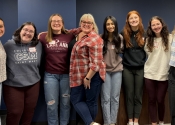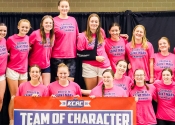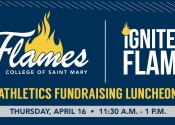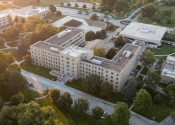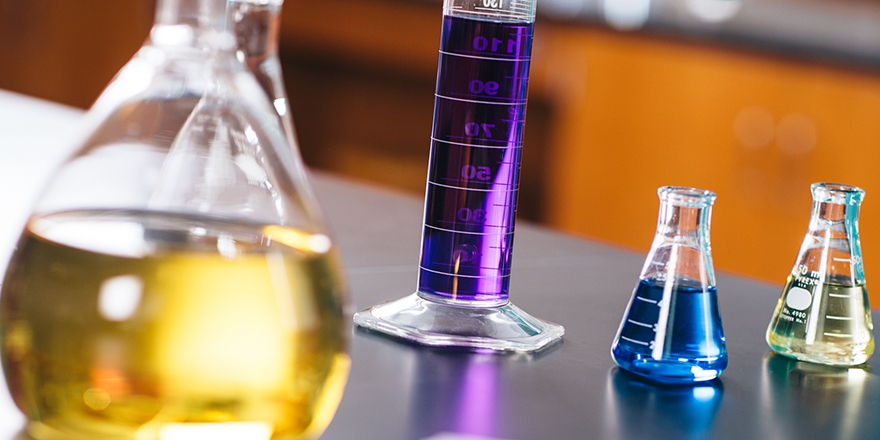
CSM workshops helping teachers put wow factor into K-6 STEM classrooms
Omaha, Neb. – They start out with a child’s enthusiasm for exploring STEM topics, but for today’s K-6 students the excitement fades by high school. “Studies show that most students are completely disinterested in science by the time they hit 7th grade,” says Dr. Amanda Roe, assistant professor of biology at College of Saint Mary.
The challenge facing K-6 STEM educators is two-fold. Why does a student’s initial enthusiasm for STEM fade? And how can educators not only retain, but build on that initial enthusiasm?
That challenge is being met by CSM’s new Science Enrichment Workshop Series for K-6 STEM educators, led by CSM’s Roe, Dr. Ganesh Naik and Nancy Thornblad. The three tag-teach 23 Omaha-area teachers in the pilot program that began last November.
Part of the challenge in maintaining student enthusiasm for science is a result of the teacher’s own academic training, says Roe. Most educators have a strong background in language arts, but not so much in science, technology, engineering and math. That means less confidence when teaching STEM subjects.
The other part of the challenge lies in the traditional method for teaching science: rote memorization. Asking students to merely memorize facts rather than engaging them stifles their natural curiosity and enthusiasm.
Combine an educator’s lack of self-confidence with a teaching model that relies heavily upon memorization and you’ve got the economics class from Ferris Bueller’s Day Off. Lots of uninterested students with glazed eyes.
The main goals of CSM’s STEM workshops are to increase teachers’ confidence and help them develop STEM-savvy and enthusiastic students through an inquiry-based teaching/learning model.
Inquiry-based learning actively engages students; it more closely resembles how scientists actually work. Students don’t just learn science – they do science. They learn to identify problems, gather data and draw conclusions. They are empowered to find their own answers through questioning, data collection and strong communication skills. Students use the same processes that scientists and engineers use to identify and solve problems. Those who lean toward STEM careers develop the 21st century skills necessary for those fields. And students who will enter other industries become STEM-literate – a trait identified by the National Academy of Sciences as “necessary for the nation’s future as a prosperous and democratic state.”
“We are in a unique position to provide this continuing education for Omaha-area STEM teachers,” says Roe. “CSM has a very strong education major as well as a strong STEM connection to many schools in the Omaha area.” The college has worked in elementary school science outreach since 2011.
Elementary schools represented by the teachers in the workshops include St. Stephen the Martyr School, Christ the King School, St. Vincent de Paul Catholic School, Liberty Elementary School, and Mary Our Queen Catholic School in Omaha; Cody Elementary School, Holling Heights Elementary and Norman Rockwell Elementary, Millard; Saint Columbkille School, Papillion; and St. Mary’s Elementary School, Bellevue.
The program includes six once-a-month, Saturday workshops, where the teachers work directly with doctoral-level science and education faculty. Each workshop has two sections. The morning section focuses on increasing the educators’ background knowledge in STEM subjects. It includes hands-on scientific activities which the teachers take back to their own classrooms. During the afternoon they focus on inquiry-based methods for teaching STEM subjects.
Roe says the program has been very effective. The educators are building up their knowledge base in STEM subjects, increasing their self-confidence, and developing their inquiry-based teaching skills. They also earn two graduate level education credits.
The workshops are empowering the educators in another way, says Roe. They find that they aren’t teaching in a vacuum, all alone. “I have heard many of them say how great it is to sit and just talk science for a few hours with other teachers who have the same experiences.”
The 2015-16 pilot program was made possible by a grant from the Claire M Hubbard Foundation and is on-going for at least the next two years. Roe says it has been so successful that plans are already in the works for another workshop series for the 2016-17 school year. K-6 STEM educators interested in participating in the fall 2016 workshops should contact Nancy Thornblad, nthornblad [at] CSM.edu.






